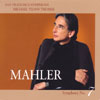Mahler Symphony No 7
A Mahler symphony on SACD
View record and artist detailsRecord and Artist Details
Composer or Director: Gustav Mahler
Genre:
Orchestral
Label: SFS Media
Magazine Review Date: 12/2005
Media Format: Super Audio CD
Media Runtime: 78
Mastering:
Stereo
DDD
Catalogue Number: 8219360009-2

Tracks:
| Composition | Artist Credit |
|---|---|
| Symphony No. 7 |
Gustav Mahler, Composer
Gustav Mahler, Composer Michael Tilson Thomas, Conductor San Francisco Symphony Orchestra |
Author: Andrew Farach-Colton
The Seventh is considered the problem child among Mahler’s symphonies. Bernstein, in his two recordings with the NYPO (his second available only in a complete set), embraced the music’s volatile nature – its almost loopy lurching from craggy grandiosity to ‘Hoffmannesque spookiness’ (in Deryck Cooke’s words) to festive frenzy.
Michael Tilson Thomas has now made two recordings as well. His first (for RCA in 1997 with the LSO) took a far less manic view than Bernstein, offering fewer thrills but more poetry. Tilson Thomas allows the score to unfold with greater naturalness. His new version, recorded live this year, is markedly more urgent, however. From the first bars, there’s a feeling of breathlessness and anxiety, and as the movement progresses, one senses the screws being tightened more forcefully than earlier. The result is edgier, more biting and not always as convincing.
The San Francisco Symphony are on top form – oboist William Bennett deserves special praise for his lovely solos in the fourth movement – though in high-lying passages the violins often sound strident (at least compared with the LSO’s). Close microphone placement may be to blame for this, and for the lack of the hushed quality that made the quiet passages in the previous recording so impressive. Some may prefer the darker, sinister reading of the Scherzo here, though I rather liked the mercurial playfulness of the LSO version. I also prefer Tilson Thomas’s slightly more relaxed tempo for the fourth movement on the RCA set. It’s in the finale that the new recording wins out, not just for its gleaming brilliance but for its exuberant mischievousness.
Michael Tilson Thomas has now made two recordings as well. His first (for RCA in 1997 with the LSO) took a far less manic view than Bernstein, offering fewer thrills but more poetry. Tilson Thomas allows the score to unfold with greater naturalness. His new version, recorded live this year, is markedly more urgent, however. From the first bars, there’s a feeling of breathlessness and anxiety, and as the movement progresses, one senses the screws being tightened more forcefully than earlier. The result is edgier, more biting and not always as convincing.
The San Francisco Symphony are on top form – oboist William Bennett deserves special praise for his lovely solos in the fourth movement – though in high-lying passages the violins often sound strident (at least compared with the LSO’s). Close microphone placement may be to blame for this, and for the lack of the hushed quality that made the quiet passages in the previous recording so impressive. Some may prefer the darker, sinister reading of the Scherzo here, though I rather liked the mercurial playfulness of the LSO version. I also prefer Tilson Thomas’s slightly more relaxed tempo for the fourth movement on the RCA set. It’s in the finale that the new recording wins out, not just for its gleaming brilliance but for its exuberant mischievousness.
Discover the world's largest classical music catalogue with Presto Music.

Gramophone Digital Club
- Digital Edition
- Digital Archive
- Reviews Database
- Full website access
From £8.75 / month
Subscribe
Gramophone Full Club
- Print Edition
- Digital Edition
- Digital Archive
- Reviews Database
- Full website access
From £11.00 / month
Subscribe
If you are a library, university or other organisation that would be interested in an institutional subscription to Gramophone please click here for further information.




